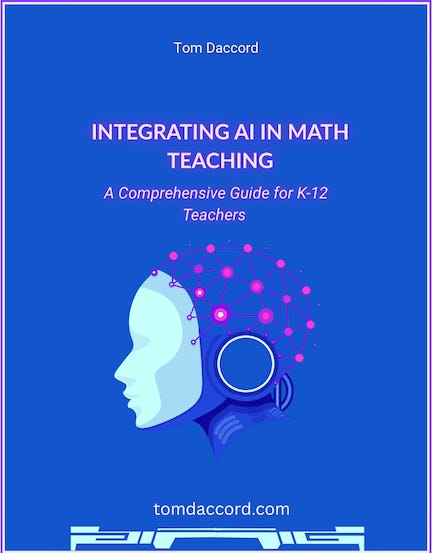AI in Edu: News, Tools, & Views (August 8)
Welcome to my weekly digest of AI in education news, tools, and views to help keep you informed. Let’s get started:
Google Introduces ‘Guided Learning’
As reported at tomdaccord.com, Google has launched “Guided Learning” in Gemini, a personal learning assistant designed to foster active learning through open-ended questions, step-by-step explanations, and multimodal content like diagrams, videos, images, and interactive quizzes. Built on LearnLM with educational design input from educators and cognitive scientists, it's shareable via Google Classroom and available to all Gemini users (quizzes for users 18+).
https://www.tomdaccord.com/blog/google-introduces-guided-learning
Open AI Introduces GPT-5
OpenAI has unveiled GPT‑5, a LLM system that promises expert-level performance across coding, writing, math, and other tasks and automatically switches between fast or deep reasoning modes via a dynamic router. OpenAI claims dramatic improvements: fewer hallucinations, enhanced honesty, safer responses, and strong benchmark results, and “GPT‑5 pro” for ultra‑complex queries. Free and paid ChatGPT users gain immediate access, with paid tiers enjoying extended usage and capabilities. (See “And More…” section below for select commentaries.)
https://openai.com/index/introducing-gpt-5/
My new, free 90-page guidebook is now available for download at tomdaccord.com !
AI Tool Demo: Generating Podcasts About Class Content With NotebookLM
Edutopia illustrates how using Google’s NotebookLM, teachers can create podcasts with two AI hosts that discuss class content based on uploaded sources. An interactive mode allows students to ask questions during playback. Educators use the tool for content review, media literacy, and engagement and some even insert false information to sharpen critical thinking. Others encourage students to generate their own AI podcasts, or use the tool for nonacademic purposes like staff communication.
https://www.edutopia.org/video/ai-tool-demo-generating-podcasts-with-notebooklm
Bot Stacking Your Way to a #GenAI Dream Team
This TCEA post advocates “bot stacking”, combining multiple AI models, each with specific strengths, working in sequence, to function as a more powerful, nuanced approach than relying on a single AI tool. For example, one model handles research, another analyzes context, and yet another crafts lesson materials. The post outlines model categories (visual designers, researchers, all-rounders, specialists) and offers the CRAFT method (Clarify, Role-play, Add context, Format, Test) to create effective prompts. Ultimately, educators remain the critical orchestrators.
https://blog.tcea.org/bot-stacking-your-way-to-a-genai-dream-team/
Amira Learning: Teaching With The AI-Powered Reading Tool
Tech&Learning explains that Amira Learning is an AI-powered reading assistant that listens to students as they read aloud, assesses strengths and weaknesses using advanced speech recognition and NLP, and provides real-time feedback. As such, it acts as both tutor and instructional aid in line with science-of-reading principles. Built on Claude AI, it's supported by research, including studies showing it can match human tutoring outcomes and improve vocabulary. With over 4 million students using it, it helps teachers personalize instruction and lesson planning.
https://www.techlearning.com/how-to/amira-learning-teaching-with-the-ai-powered-reading-tool
Create personal illustrated storybooks in the Gemini app
Google’s Gemini app now lets users generate personalized, illustrated storybooks (about 10 pages long) with narrated read-aloud audio. Just describe your idea, and Gemini creates unique visuals and storytelling in any style, from comics to claymation, drawing inspiration from your own images and files. It supports over 45 languages and offers creative uses like explaining the solar system or transforming family photos into magical children’s adventures.
https://blog.google/products/gemini/storybooks/
SHIFT to Embrace AI: Shaping Your Legacy
In this Tech&Learning article, GaETC keynoter and global educator Ayo Jones challenges educators to see AI as an opportunity, not a threat, through her “Three Foundational SHIFTs.” She urged a mindset shift focusing on legacy-building, strategic adoption, and human connection. Educators should bolster students' skills like creativity, critical thinking, and problem-solving as early as kindergarten, even without AI tools. Key steps include prioritizing strategy over tools, assessing fit for your institution, and investing in professional development for thoughtful integration.
https://www.techlearning.com/news/shift-to-embrace-ai-shaping-your-legacy
And More…
The Collaborative AI Classroom: Teaching Students to Work With, Not Against, AI Tools - Faculty Focus
Making AI work for schools - Brookings Institution
Question: How Do You Define the Boundaries of Acceptable AI Use for Your Students? - Edutopia
Strategies for Taking Advantage of AI as a New Administrator - Edutopia
Students are anxious about the future with AI–their parents are, too - eSchoolNews
6 Things We’re Getting Wrong About Tech Integration - Edutopia
Does Generative AI Use Really Atrophy Your Brain? Debunking the Myth - Richard Noble
GPT-5 Is Here: There's Only One Feature Worth Writing About - Alberto Romero
GPT-5: It Just Does Stuff - Ethan Mollick
OpenAI releases a free GPT model that can run on your laptop - The Verge
ChatGPT will ‘better detect’ mental distress after reports of it feeding people’s delusions - The Verge
Any suggestions to improve this newsletter? Please message me or leave a comment below!


